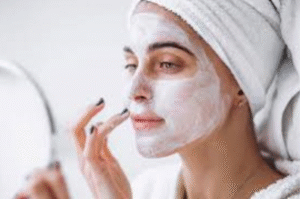Have you ever caught yourself staring at someone with that enviable, lit-from-within glow and wondered what their secret might be? You know the look – that natural radiance that seems to make their skin shimmer without any highlighter or makeup tricks.
The truth is, achieving a naturally glowing face doesn’t require expensive treatments or complicated routines that take hours to complete. Making your face glow naturally is something every person can accomplish with the right knowledge and consistent habits.
The journey to radiant skin starts with understanding that true glow comes from healthy skin cells, proper hydration, and nurturing your skin barrier with gentle, effective practices. From simple dietary changes to smart skincare choices, these tips focus on working with your skin’s natural processes rather than against them.

Understanding Natural Skin Glow
Healthy, glowing skin reflects light evenly across its surface, creating a smooth, radiant appearance. This happens when your skin cells are properly hydrated, your circulation is optimal, and your skin barrier functions effectively to protect and maintain moisture levels.
When your face glows naturally, it indicates that your skin is receiving adequate nutrients, staying well-hydrated, and effectively removing dead skin cells that can create a dull, lackluster appearance. The good news is that achieving this doesn’t require expensive procedures or products filled with harsh ingredients.
Stay Hydrated for Radiant Skin
Water serves as the foundation for naturally glowing skin, and maintaining proper hydration levels can dramatically improve your complexion’s appearance.
- When your body receives adequate water intake, your skin cells plump up, creating a smoother, more radiant surface that reflects light beautifully.
- Dehydration shows up quickly on your face, often appearing as fine lines, dullness, and an overall tired appearance.
- Drinking sufficient water throughout the day helps flush toxins from your system while delivering essential nutrients to your skin cells.
- This process supports your skin’s natural renewal cycle and helps maintain the moisture barrier that keeps your complexion looking healthy and vibrant.
- Beyond simply drinking more water, you can boost hydration by eating water-rich foods like cucumbers, watermelon, and leafy greens.
- These foods provide both hydration and valuable nutrients that support skin health from within.
- Additionally, using a humidifier in your living space can help maintain optimal moisture levels in the air, preventing your skin from losing water to dry environments.
Nourish Your Skin with Proper Nutrition
The connection between diet and skin health runs deeper than many people realize, and making your face glow naturally often starts with the foods you choose to fuel your body.

- Antioxidant-rich foods fight free radical damage that can cause premature aging and dullness, while healthy fats support your skin barrier function.
- Incorporating fruits and vegetables into your daily meals provides your skin with vitamins C and E, beta-carotene, and other powerful compounds that promote cellular repair and protection.
- Foods like berries, sweet potatoes, spinach, and bell peppers contain high levels of these skin-supporting nutrients.
- Omega-3 fatty acids, which are present in walnuts, flaxseeds, and fish, help keep skin supple and lower inflammation, which can cause irritation and breakouts.
- These healthy fats also support your skin’s natural oil production, helping maintain that dewy, healthy appearance without excess oiliness.
- Limiting processed foods, excessive sugar, and dairy can also contribute to clearer, more radiant skin for many people.
- These foods can trigger inflammation and hormonal fluctuations that may manifest as breakouts, redness, or dullness on your face.
Establish a Gentle Cleansing Routine
Creating a consistent, gentle cleansing routine forms the cornerstone of any effective strategy to make your face glow naturally.

- Over-cleansing or using harsh products can strip your skin’s natural oils, leading to irritation, dryness, and a compromised skin barrier that appears dull and lackluster.
- Choose a mild cleanser appropriate for your skin type and use it twice daily – once in the morning to remove overnight impurities and once in the evening to clear away makeup, sunscreen, and daily environmental pollutants.
- Lukewarm water works best for cleansing, as hot water can be too aggressive and cold water may not effectively remove oils and debris.
- The double cleansing method, particularly popular in Korean skincare routines, can be especially effective for achieving naturally glowing skin.
- This entails dissolving sunscreen and makeup with an oil-based cleanser first, then washing with a water-based cleanser to get rid of any leftover contaminants.
- This thorough but gentle approach ensures your skin is completely clean without being stripped of essential moisture.
This gentle approach helps preserve your skin’s natural protective barrier while preparing it to better absorb the beneficial products you’ll apply next.
Exfoliate Regularly for Smooth Texture
Regular exfoliation plays a crucial role in revealing the naturally glowing skin beneath the surface by removing dead skin cells that can create a dull, uneven appearance. However, the key to effective exfoliation lies in finding the right balance – enough to promote cell turnover without causing irritation or damage.

- Chemical exfoliants like alpha hydroxy acids (AHAs) and beta hydroxy acids (BHAs) offer gentle yet effective ways to improve skin texture and radiance.
- AHAs such as glycolic acid and lactic acid work on the skin’s surface to dissolve the bonds between dead skin cells, revealing fresher, brighter skin underneath.
- BHAs like salicylic acid can enter pores more deeply, they are especially helpful for people with oily or acne-prone skin.
- For those who prefer physical exfoliation, gentle scrubs with fine particles can be effective when used sparingly.
- Natural options like finely ground oatmeal or rice powder provide mild exfoliation without the harsh abrasion that can damage sensitive facial skin.
- The type and sensitivity of your skin determine how often you should exfoliate. Most people benefit from exfoliating 1-3 times per week, starting slowly and gradually increasing frequency as your skin builds tolerance.
Pay attention to how your skin responds and adjust accordingly – over-exfoliation can lead to redness, sensitivity, and ironically, a duller appearance.
Moisturize Consistently for Healthy Barriers
Consistent moisturizing represents one of the most fundamental steps in making your face glow naturally, as properly hydrated skin appears plumper, smoother, and more radiant.

- A good moisturizer helps lock in hydration while supporting your skin’s natural barrier function, which protects against environmental damage and water loss.
- Different skin types require different approaches to moisturizing. Those with dry skin benefit from richer, cream-based formulas containing ingredients like ceramides, hyaluronic acid, and natural oils.
- Lightweight, gel-based moisturizers that hydrate without extra oil in the skin are frequently preferred by people with oily skin types.
- By helping to seal in the additional moisture, applying a moisturizer to slightly damp skin can increase its effectiveness.
- This technique, known as ‘wet skin moisturizing,’ can be particularly beneficial for achieving that dewy, naturally glowing appearance.
- Don’t forget to extend your moisturizing routine to your neck and décolletage, as these areas also contribute to your overall appearance and can show signs of neglect if not properly cared for.
Consistency in your moisturizing routine will yield better results than sporadic use of even the most expensive products.
Protect Your Skin with Daily Sunscreen
Sun protection stands as perhaps the most important factor in maintaining naturally glowing skin over time, as UV damage can cause premature aging, dark spots, and a leathery texture that’s anything but radiant.
- Daily sunscreen use prevents these issues while helping your skin maintain its youthful appearance and natural luminosity.
- Apply liberal amounts of a broad-spectrum sunscreen with at least SPF 30 to your face and neck’s exposed areas.
- Mineral sunscreens containing zinc oxide or titanium dioxide tend to be gentler on sensitive skin, while chemical sunscreens may feel lighter and blend more seamlessly under makeup.
- Reapplication throughout the day is crucial for maintaining protection, especially if you spend time outdoors or near windows where UV rays can still reach your skin.
- Many people find tinted moisturizers or BB creams with SPF convenient for touch-ups throughout the day.
Remember that sun damage accumulates over time, so consistent daily protection is more important than occasional use of high-SPF products. Even on cloudy days or when spending most of your time indoors, UV rays can still affect your skin and contribute to premature aging and dullness.

Incorporate Face Massage for Better Circulation
Regular facial massage offers a simple yet effective way to boost circulation and promote the natural glow that comes from improved blood flow to your skin.
- This increased circulation delivers more oxygen and nutrients to your skin cells while helping to drain lymphatic fluid that can cause puffiness and dullness.
- You can perform facial massage using clean hands, a jade roller, or a gua sha tool. The key is to use gentle, upward motions that follow the natural contours of your face.
- Start at your jawline and work upward toward your temples, then move to your cheeks and finish with your forehead area.
- Incorporating facial massage into your skincare routine can also help your products absorb more effectively while providing a relaxing moment of self-care in your day.
- Even just five minutes of daily facial massage can make a noticeable difference in your skin’s appearance and how you feel about your skincare routine.
The stress-relieving benefits of this practice can also contribute to better overall skin health, as stress often manifests in skin issues like breakouts and dullness.
Get Quality Sleep for Skin Repair
Quality sleep plays an essential role in making your face glow naturally, as your skin undergoes its most important repair and regeneration processes during nighttime hours.
- Your body repairs damage from UV rays and environmental stressors, rebuilds collagen, and boosts blood flow to the skin as you sleep.
- Lack of adequate sleep shows up quickly on your face in the form of dark circles, puffiness, and a dull, tired complexion.
- Chronic sleep deprivation can also lead to increased stress hormones that may trigger breakouts and accelerated aging.
- You may significantly enhance the look and natural luminosity of your skin by establishing a regular sleep pattern and aiming for 7-9 hours of good sleep per night.
- Your pillowcase material can also impact your skin – silk or satin pillowcases create less friction against your skin and may help prevent sleep lines and hair tangles.
Establishing a relaxing bedtime routine that includes removing makeup, cleansing your skin, and applying nighttime skincare products signals to your body that it’s time to begin the repair process.
Manage Stress for Clearer Complexion
Chronic stress can significantly impact your skin’s ability to maintain its natural glow, as elevated stress hormones can trigger inflammation, breakouts, and accelerated aging.
- Learning to manage stress effectively often results in noticeable improvements in skin clarity and radiance.
- Stress affects your skin through multiple pathways – it can increase oil production, slow down healing processes, and compromise your skin barrier function.
- These changes often manifest as breakouts, sensitivity, and a dull, lackluster appearance that’s the opposite of the natural glow you’re seeking.
- Incorporating stress-management techniques like meditation, deep breathing exercises, or regular physical activity can help counteract these negative effects.
- Even simple practices like taking short walks, practicing gratitude, or engaging in hobbies you enjoy can help reduce stress levels and their impact on your skin.
The mind-skin connection is stronger than many people realize, and addressing stress often leads to improvements in skin health that go beyond what topical products alone can achieve. Finding healthy ways to cope with daily stressors becomes an investment in both your mental well-being and your skin’s natural radiance.
Exercise Regularly for Healthy Circulation
Regular physical activity contributes to naturally glowing skin by boosting circulation, reducing stress hormones, and promoting the delivery of oxygen and nutrients to your skin cells.

- The increased blood flow during exercise gives your skin a temporary flush that can become more permanent with consistent activity.
- Exercise also helps regulate hormones that can affect skin health, particularly those related to stress and insulin sensitivity. This hormonal balance can lead to fewer breakouts and a more even skin tone over time.
- The sweating that occurs during exercise helps clear pores of impurities, though it’s important to cleanse your skin promptly after working out to prevent these released toxins from causing irritation or breakouts.
- Choose breathable workout clothing and avoid touching your face during exercise to minimize the risk of transferring bacteria.
- Whether you prefer walking, yoga, dancing, or more intense activities, finding forms of movement you enjoy makes it easier to maintain consistency.
The stress-relieving benefits of regular exercise also contribute to better sleep and overall skin health.
FAQs
How long does it take to see results from natural skincare methods?
Most people begin to notice subtle improvements in their skin’s appearance within 2-4 weeks of consistently following natural skincare practices. However, significant changes in skin texture, tone, and overall glow typically become more apparent after 6-8 weeks of dedicated effort.
This timeline varies depending on your starting point, skin type, and how consistently you implement these practices. Remember that skin cell turnover occurs approximately every 28 days, so patience and consistency are key to achieving lasting results.
Can diet really make a difference in how my skin looks?
Diet absolutely influences your skin’s appearance and can significantly impact your ability to achieve a natural glow. Foods rich in antioxidants, healthy fats, and vitamins directly support skin health by fighting free radical damage, maintaining proper hydration, and supporting collagen production.
In contrast, diets high in processed foods, sugar, and dairy can trigger inflammation that manifests as breakouts, redness, and dullness. The effects of dietary changes on skin health typically become noticeable within 4-6 weeks of consistent healthy eating habits.
Is it necessary to use expensive skincare products to get glowing skin?
Expensive skincare products are not necessary to achieve naturally glowing skin. Many effective ingredients like gentle cleansers, basic moisturizers with hyaluronic acid, and broad-spectrum sunscreens are available at affordable price points.
The key lies in consistency, choosing products appropriate for your skin type, and focusing on proven ingredients rather than marketing claims. Simple, well-formulated products often work better than complex, expensive formulations that may contain unnecessary additives or irritating ingredients.
What’s the biggest mistake people make when trying to get glowing skin?
The most common mistake people make is over-treating their skin in an attempt to see faster results. This includes excessive cleansing, over-exfoliating, using too many active ingredients at once, or constantly switching products.
These practices can damage the skin barrier, leading to irritation, sensitivity, and paradoxically, a duller appearance. The path to naturally glowing skin requires patience, consistency, and gentle care rather than aggressive treatments.
How important is sunscreen for maintaining glowing skin?
Sunscreen is absolutely crucial for maintaining naturally glowing skin both in the short term and long term. UV damage causes immediate effects like inflammation and long-term consequences including premature aging, dark spots, and loss of skin elasticity. Daily broad-spectrum SPF protection prevents these issues while allowing your skin’s natural repair processes to work effectively.
Many people underestimate how much sun exposure they receive during daily activities, making consistent sunscreen use one of the most important steps in any skincare routine focused on achieving and maintaining a natural glow.
Conclusion…
Achieving a naturally glowing face doesn’t require complicated routines or expensive treatments – it comes down to consistent, gentle care that works with your skin’s natural processes. These ten tips provide a comprehensive approach to making your face glow naturally by addressing both internal and external factors that influence skin health and appearance.
Start by implementing one or two of these tips and gradually build your routine as your skin adapts. The goal is to create sustainable habits that support your skin’s health over the long term, not to achieve instant transformation that may not last.
Making your face glow naturally is ultimately about treating your skin with kindness and giving it the tools it needs to function at its best, you’ll discover that the radiant, healthy complexion you’ve been seeking was always possible – it just needed the right support to emerge.



